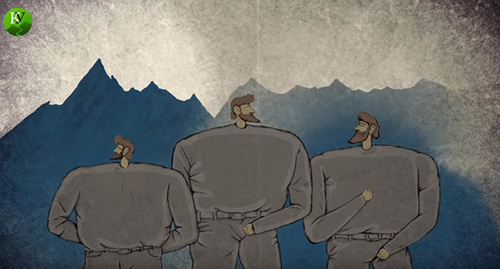Appeal to excuse Kadyrov's relative for road accident reminds of blood feud traditions
In Chechnya, after a fatal road traffic accident, reconciliation of blood feud parties usually takes place quickly, but a driver's behaviour is a key, report experts interviewed by the "Caucasian Knot" after a resonant road traffic accident, in which an official, a relative of Ramzan Kadyrov, had been found guilty.
The "Caucasian Knot" has reported that earlier, in social networks, residents of Chechnya demanded from the leader of the republic to react to the fatal road traffic accident, in which a top-ranking official, a cousin of Ramzan Kadyrov, had been found guilty. Later, a video appeal appeared on the Internet, in which relatives of the victims asked Ramzan Kadyrov not to punish the official.
If a driver was in a state of alcoholic intoxication or escaped from the place of the road traffic accident without assisting a person hit by him, then relatives of the deceased person declare the blood feud to the person guilty of the road traffic accident, and it can last for years, the "Caucasian Knot" correspondent was told by Saida Sirazhudinova, the president of the Centre for Studying Global Issues of Modernity and Regional Problems.
During the process of reconciliation of blood feud parties, much depends on the circumstances of a person's death, says Aza Sarakaeva, the head of the Natural Sciences Department at the Chechen Institute for Advanced Studies of Education Workers, who is engaged in the study of the Chechen customs. If a driver guilty for the death of a person was not in a state of alcoholic intoxication and tried to help the person hit by him, the reconciliation procedure proceeds fairly quickly and without problems.
According to Aza Sarakaeva, the blood feud is not a Muslim tradition, since it goes back to Adat, a set of unwritten laws under which the Vainakhs, ancestors of modern Chechen and Ingush people, lived before the adoption of Islam," the researcher noted.
Aza Sarakaeva has explained that the blood feud tradition requires strict observance of certain rules.
"If your relative is killed, you must take revenge or forgive the guilty person, as required by the blood feud tradition. Otherwise, the society will not understand you and draw its own conclusions, which are unlikely to be in your favour. In other words, that would be shame and dishonour," said Aza Sarakaeva.
This article was originally published on the Russian page of 24/7 Internet agency ‘Caucasian Knot’ on December 19, 2018 at 01:47 pm MSK. To access the full text of the article, click here.
Source: CK correspondent





![Tumso Abdurakhmanov. Screenshot from video posted by Abu-Saddam Shishani [LIVE] http://www.youtube.com/watch?v=mIR3s7AB0Uw Tumso Abdurakhmanov. Screenshot from video posted by Abu-Saddam Shishani [LIVE] http://www.youtube.com/watch?v=mIR3s7AB0Uw](/system/uploads/article_image/image/0001/18460/main_image_Tumso.jpg)